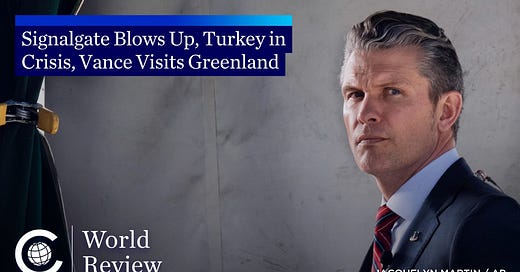World Review: Signalgate Blows Up, Turkey in Crisis, Vance Visits Greenland
A brief synopsis of this week's show
Each Friday morning, I host a video podcast called “World Review with Ivo Daalder” where three journalists from major news outlets around the world join me to discuss the latest global news stories of the week.
This morning, March 28, we discussed Signalgate, Turkey’s decision to imprison a popular opposition figure, and Vice President JD Vance’s visit to Greenland. Joining me this week were Nahal Toosi of Politico, Steve Erlanger of the New York Times, and Matt Kaminski of Politico.
“World Review is always fascinating. I love the fact that you can get journalists from around the world to participate since zoom is the medium.”
— A Subscriber to America Abroad
While I encourage you to watch or listen to the episode (and subscribe wherever you get your podcasts!), here are a few interesting things I took away from our discussion:
The biggest story of the week was surely the publication in The Atlantic detailing a chat on Signal among President Trump’s top national security advisers in the days preceding the US strikes against Houthis in Yemen earlier this month. The magazine’s editor in chief, Jeffrey Goldberg, had mistakenly been added to the chat by National Security Advisor Mike Waltz, and he detailed the conversation that took place. It provided an amazing insight into the way the Trump administration operates and the arguments that appeal to different players. There is so much to say about the story that it will take weeks to sort out. But one of the issues Nahal highlighted is that it is quite clear that this wasn’t a one off. While Waltz added Goldberg to the chat before indicating he was creating a “small PC” (or Principals Committee, which consists of the top cabinet-level officials responsible for national security), the chat suggests that this group has existed for some time and has been used to discuss what are by definition very sensitive national security issues. I addressed a few other aspects of this in an earlier post America Abroad as well as in my Politico Europe column this morning.
Last week, Turkish law enforcement officials arrested the very popular mayor of Istanbul, Ekrem Imamoglu, who was preparing to run for president in forthcoming elections. His arrested set off a firestorm, with hundreds of thousands of people protesting in big cities and small towns against his arrest and confinement. The economy tanked, as foreign currency fled the country and investment started to dry up. Police arrested well over a 1,000 protestors and countered demonstrations with water cannons and pepper sprays. Why risk these protests now? Matt suggested that Erdogan saw an opportunity to deal with his opposition at a time when Europe was focused on dealing with Trump and Washington was unlikely to notice or care. Erdogan was running on a high streak, having vanquished his Syrian nemesis Bashir al-Assad, forced the Kurds to declare a ceasefire and end an armed insurrection, and turned the economy around. He may suffer some backlashes in the short run, but will likely see his position consolidated in the long run.
Finally, Greenland. Today, Vice President JD Vance and his wife Usha traveled to the US Air Base Pitufikk in norther Greenland to “check out” the security situation in the isolated high north. The visit had set off a firestorm in Greenland, whose prime minister had termed it “aggressive,” and Denmark, which still holds sovereignty over the island. Steve indicated that there were good strategic reasons for the US to care about the island. Climate change was opening up shipping routes and the island itself has large stores of critical minerals. Russia and China were both casing the area in search for strategic advantage. What’s unclear, however, is why ownership of the landmass is key to securing these strategic interests. The US military has access to the island under a 1951 agreement with Denmark and, with proper notification, can expand that access at any time. Greenland is no doubt interested in developing its minerals and other national resources and would see US industry as a natural ally. All of which raises the larger point of what Trump and his administration are up to when they insist Greenland needs to be part of the United States. Is it playing the kind of hard-ball negotiating tactics Trump prides himself on pursuing? Or is ownership the real goal?
That’s it for my quick takes of this week’s episode here on America Abroad. To get the full flavor, please listen to the episode itself.






You ask, "All of which raises the larger point of what Trump and his administration are up to when they insist Greenland needs to be part of the United States. "
My guess is that the Greenland and Canada 51st state issues are headline grabbers, a highly predictable Trump move. Rosie O'Donnell is fat, Obama is not a real American, Mexico is gonna pay for the wall, etc etc.
If they were serious about the Greenland grab, they seem to be going about it in exactly the wrong way. They've got everyone in Greenland very upset and resistant, and have offered no specific plan of how the transfer of ownership might actually happen. But every time anyone in the administration says the word "Greenland" they get free press.
As best I can tell, the Greenland story is just about making sure everyone is talking about Trump all day long every day. If that's the real plan, it's working.